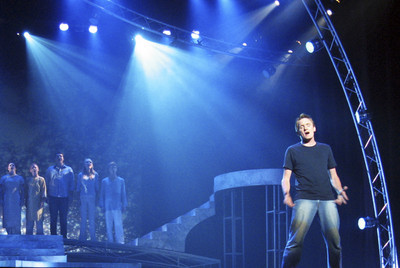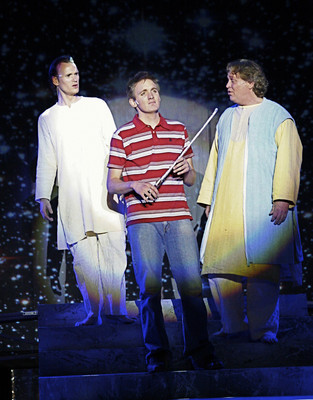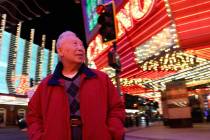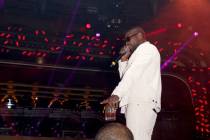Latter-day Broadway
Tevye with a Latter-day tint?
"You could call it a Mormon 'Fiddler on the Roof,' " says Doug Stewart, writer/producer/lyricist of "Saturday's Warrior" and its sequel, "The White Star," taking their tandem tour to Cashman Theatre for Saturday and Monday performances.
Sounds like a hybrid, high-concept Hollywood pitch: " 'Die Hard' in a delicatessen!"
But these parallels transcend such tackiness. After all, it's got family tradition on Earth, a little matchmaking, matchmaking in the pre-existence, and it's a God-fearing salute to life! (Minus "l'chaim.")
"People think it's going to be really religious, but it just happens to be about a Mormon family," Stewart says about the twin takes on family values in the pre-life and well, life-life.
"It does talk about missionaries, but the word 'Mormon' is never used, and it has appeal beyond the Latter-day Saint market. When we did the first California production, we ran for three weeks and the first couple of weeks, the audiences were Latter-day Saints. Then they started bringing non-Mormon friends, and by closing night, we did a tally and 30 percent of the audience was non-Mormon. That's why we call it our 'Fiddler on the Roof.' "
Authored by Stewart (with music by Lex de Azevedo) in 1973 as a submission to a Utah playwriting competition, "Saturday's Warrior" -- the title refers to believing these are the "last days," Saturday being the last day of the week -- copped the prize and was first produced by Brigham Young University. Thirty-two years later, in 2005, Stewart penned the sequel, the two now staged as bookend pieces in one evening on an eight-city tour that kicked off in Salt Lake City.
"It's the story of a prodigal son, which is a universal story, about a young man who pulls away from his family and experiences the world, but there is redemption," says Stewart, a former Las Vegan, about the original that has endured since -- and is steeped in -- Watergate-era America.
The son is Jimmy, the oldest of a family of seven in the pre-existence, waiting to be born as the show opens. Among the clan, little Emily, the youngest, worries that when her turn comes, their parents won't want another new face in the crib. Jimmy assures Emily he will ensure she's born into their brood, while Julie, an older daughter, and Todd, another pre-existing spirit, pledge they'll find each other on Earth and wed. But once they're inhabiting their mortal coils, they recall nothing of pre-existence promises and life does, well, what life does, testing their togetherness, with Jimmy's spiritual journey at the show's core.
"We see this son as a noble young man who has ambitions to go down to Earth and make a difference in life. But then he confronts reality, all the choices down here, and he's torn by the philosophies that existed in the '70s. ... But he has a twin who is central to the show, the good conscience, the Christ character. They have different views about life and religion, but they're extremely close. She dies, and it's her death that finally brings him home."
The theme, one resonating with many Mormons, is that everyone is a child of God, an ideal they're encouraged to cling to when attacked for their beliefs. The score includes songs such as "Pullin' Together" (sung in the pre-existence), "Circle of Our Love," "Humble Way," "Sailing On" and "Will I Wait For You."
"It's neat to be able to share a part of you that's so personal," says Henderson-born Mormon actor Taylor Eliason, who plays roles in both shows and also has appeared with Signature Productions and the Red Mountain Music Company. In "Saturday's Warrior," he portrays rabble-rousing Mack, a corrosive influence on Jimmy. "But it's a show definitely oriented to anybody and everybody. It's an uplifting story, one of hope that gets away from the normal entertainment these days where it's all cheap and about sex and drugs. It's about the things we all care about, love and surviving and learning from life experiences."
In "The White Star" -- the title a metaphor for Jesus Christ -- Jimmy is now a parent, but not at peace. He's a man, Stewart says, wrestling a "demon," while his adoring son (played by Eliason) is frustrated by his father's refusal to share the secret.
"This young man has an out-of-body experience where he meets his ancestors," Stewart explains. "It's about a young man going down a road that's not similar to his dad's, but a direction that's not positive. He's trading some things off that should be important to him. But he comes to know that he must reach his dad, to open his heart and bring him back. We find out later in the second act what that secret is -- but I'm not going to tell you."
In his dual roles, Eliason wails on rock numbers in the original -- that's his bad-boy persona -- and sings soothing ballads in the sequel. "The two shows are seamlessly transitioned," Eliason says. "You've seen Jimmy his whole life, he's struggled with his beliefs. As it goes into the sequel, Jimmy is torn from his beliefs again, he doesn't know what to believe."
Merging the musicals into one 21/2-hour event, Stewart sheared some songs from the original's score and abbreviated other tunes, but insists "people who are familiar with it won't come away feeling shortchanged."
Do the shows politicize faith? Kinda-sorta-maybe. "The issues are very contemporary, having to do with the disintegration of the family, the sanctity of the family, as opposed to the breakups today. We don't get into same-sex marriage, but they are suggested."
In "Fiddler," Tevye was too outraged over a daughter's marrying out of his faith to worry about her hooking up within her gender. That was 1905 Russia. This is 2008 America.
Ask yourself: What's different? What isn't?
At least the answers have an orchestra behind them.
Contact reporter Steve Bornfeld at sbornfeld@reviewjournal.com or 702-383-0256.
what: "Saturday's Warrior"/"The White Star"
when: 7:30 p.m. Saturday and Monday
where: Cashman Theatre, 850 Las Vegas Blvd. North
ickets: $12-$19 (888-359-3277)





























